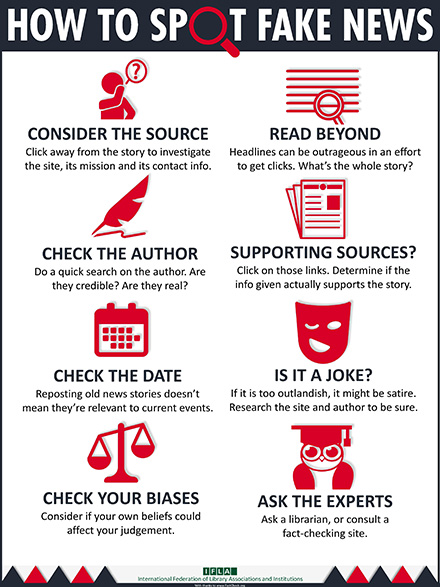You Can Combat Fake News
The phrase "fake news" was declared the official Word of the Year for 2017 by Collins Dictionary. No wonder we’re getting fatigued by the repetition of the phrase! Before the Internet existed, most news was delivered by radio, television and newspapers. These news outlets used gatekeepers, including editors and fact-checkers, who made certain that reporters followed standards of journalism. Now that we have the Internet, there are websites and social media posts made by folks who are not journalists and who are working without verification. It’s hard to separate fact from fiction.
How can we live with this constant barrage of information and opinion? My first step was to choose a news outlet that was mostly bi-partisan. I wondered if I could trust CNN more than ABC, for example. The Pew Research Organization has sought to understand news bias. They have ranked news outlets based on extensive experimentation. A chart called “Trust Levels of News Sources by Ideological Group” can be helpful. For example, their data suggest that “consistently mostly liberal” readers find NPR, PBS and the Wall Street Journal to be more trusted than distrusted. On the other hand, these same outlets were found more distrusted than trusted by consistently conservative readers. (https://www.journalism.org/2014/10/21/political-polarization-media-habits/pj_14-10-21_mediapolarization-01/)
My second step is to consider the legitimacy of articles and websites that are important to me. Librarians share their methods for evaluating information in the graphic below. As information consumers, we can decide whether news or information deserves our attention by following these suggestions. (https://www.ifla.org/publications/node/11174)
How can we live with this constant barrage of information and opinion? My first step was to choose a news outlet that was mostly bi-partisan. I wondered if I could trust CNN more than ABC, for example. The Pew Research Organization has sought to understand news bias. They have ranked news outlets based on extensive experimentation. A chart called “Trust Levels of News Sources by Ideological Group” can be helpful. For example, their data suggest that “consistently mostly liberal” readers find NPR, PBS and the Wall Street Journal to be more trusted than distrusted. On the other hand, these same outlets were found more distrusted than trusted by consistently conservative readers. (https://www.journalism.org/2014/10/21/political-polarization-media-habits/pj_14-10-21_mediapolarization-01/)
My second step is to consider the legitimacy of articles and websites that are important to me. Librarians share their methods for evaluating information in the graphic below. As information consumers, we can decide whether news or information deserves our attention by following these suggestions. (https://www.ifla.org/publications/node/11174)
There are organizations working to assess, educate, and attack “fake news.” In the confusing realm of politics, Factcheck.org was begun in 2004 to evaluate statements made by political figures. Their mission states “We are a nonpartisan, nonprofit ‘consumer advocate’ for voters that aims to reduce the level of deception and confusion in U.S. politics.” They are supported by grants and public donations listed on their website.
Fake news has been around for thousands of years. A book called Fake News, Propaganda and Plain Old Lies: How to Find Trustworthy Information in the Digital Age by Donald A. Barclay does an excellent job of explaining how our use of information got to this point. One interesting anecdote goes back to Marc Antony of Rome. Apparently a general in competition with Antony used a fake document to take power away from him.
I had an ‘aha’ moment when I understood that social media brought us into a new information age. Prior to that, computer technology and the Internet brought a smaller - but less explosive - information age. Now, instead of reading and finding information on the Internet, we can actually participate in the creation of the information. So, if we post a comment on social media or type a critique on Yelp, we have created user content and are interacting with others who may respond. And sometimes our interactions lead to polarizing opinions. The participative Internet is called Web 2.0.
In summary, we can take control of our information intake. Rather than feeling barraged, we can limit our intake to sources we have carefully chosen. We can follow methods used to evaluate information - who is the source? How old is the information? Who paid for the information? We can try to listen to both sides of a story before forming an opinion. Perhaps we can even appreciate the ease with which we can access all kinds of information.
Here are some other sources you may find helpful:
Fact-Checking Websites
Pewresearch.org- The Pew Research Center is a nonpartisan fact tank whose mission is to inform the public about the issues, attitudes and trends shaping the world through polling, research and analysis.
Snopes.com- Snopes began in 1994 investigating urban legends, hoaxes, and folklore. They are one of the oldest online fact-checking websites.
Factcheck.org- A nonpartisan, nonprofit “consumer advocate” for voters that aims to reduce the level of deception and confusion in U.S. politics.
Politifact.com- Fact-checking journalism is the heart of PolitiFact. They describe their core principles as independence, transparency, fairness, thorough reporting, and clear writing.
Articles
“Ranking the media from liberal to conservative, based on their audiences,” by Aaron Blake, October 21, 2014 taken from the internet on 9.6.19. (https://www.washingtonpost.com/news/the-fix/wp/2014/10/21/lets-rank-the-media-from-liberal-to-conservative-based-on-their-audiences/)
“Political Polarization & Media Habits” by Amy Mitchell, Jeffrey Gottfried, Jocelyn Kiley and Eva Matsa, October 21, 2014.
“A Global Guide to Initiatives Tackling “Fake News,” by Fergus Bell, May 8, 2017, Global Investigative Journalism Network. (https://gijn.org/2017/05/08/a-global-guide-to-initiatives-tackling-fake-news/)
“Civic literacy in Your News: Fact-Checking News Sources,” a Denver Public Library blog by Genine on December 19, 2018. (https://www.denverlibrary.org/blog/research/genine/civic-literacy-your-news-factchecking-news-sources)
- Jennifer, Hickory Corner Branch

Comments
Post a Comment